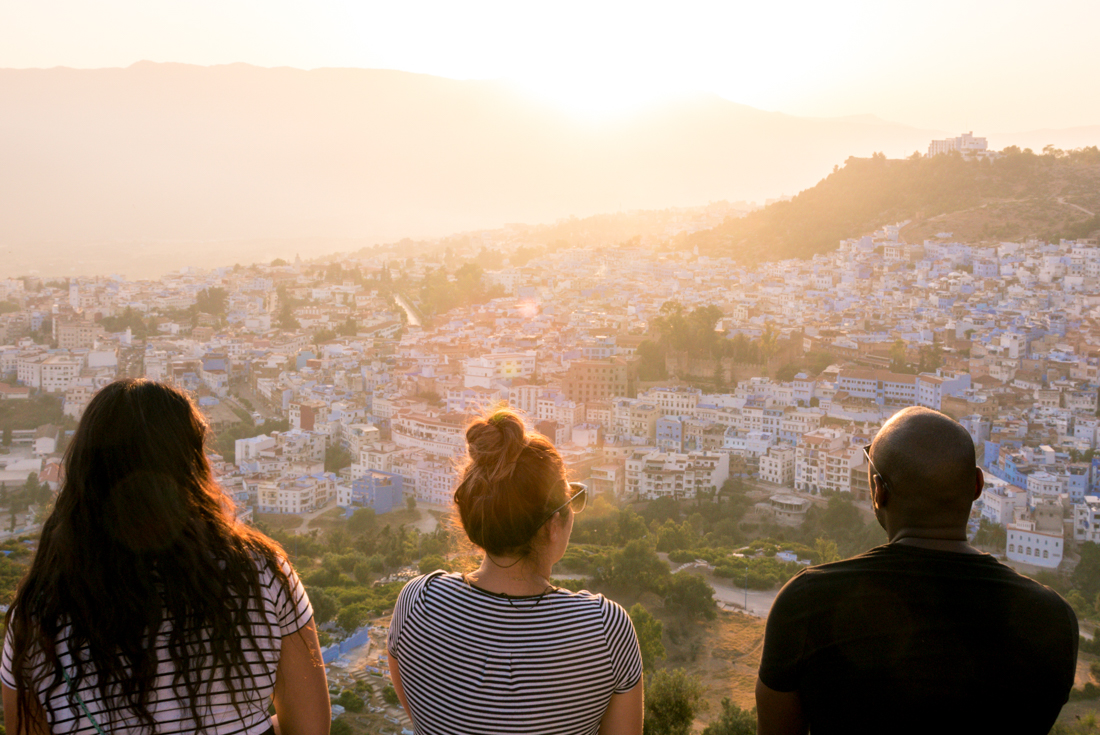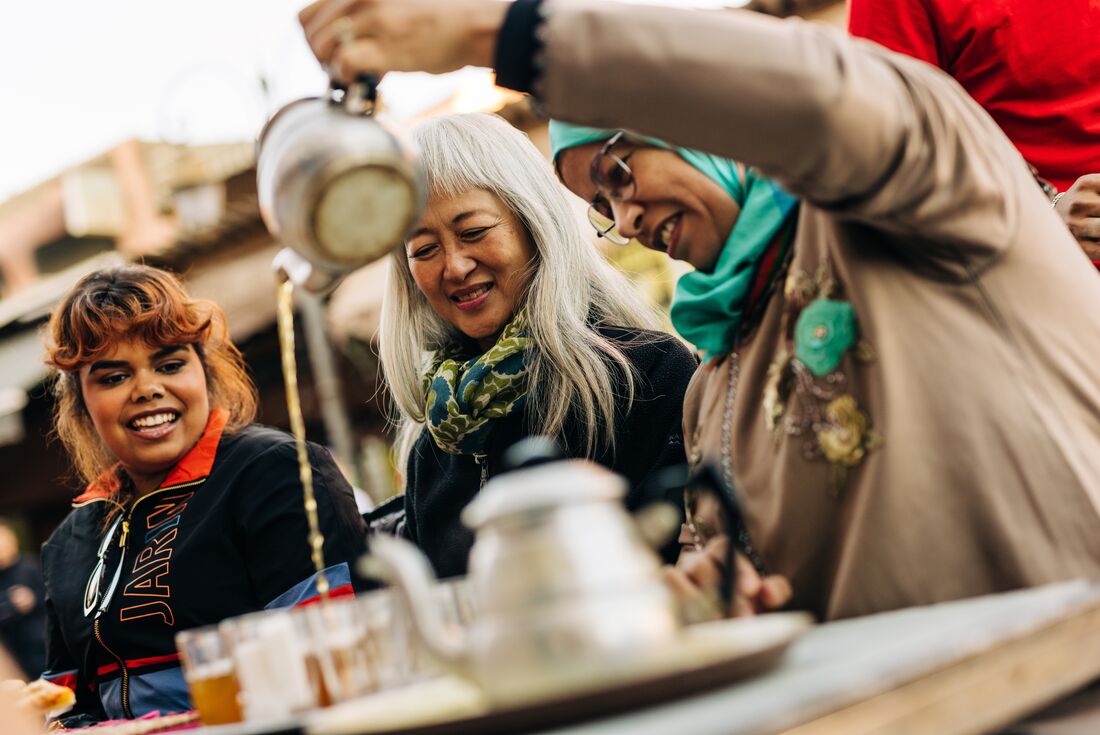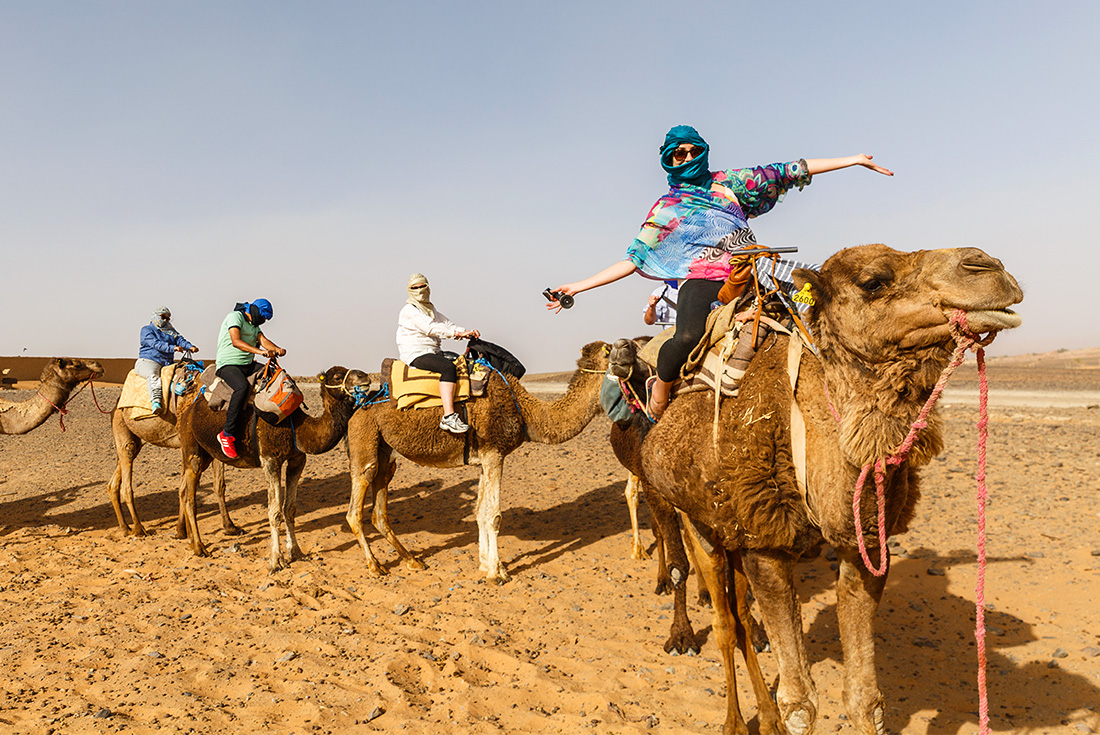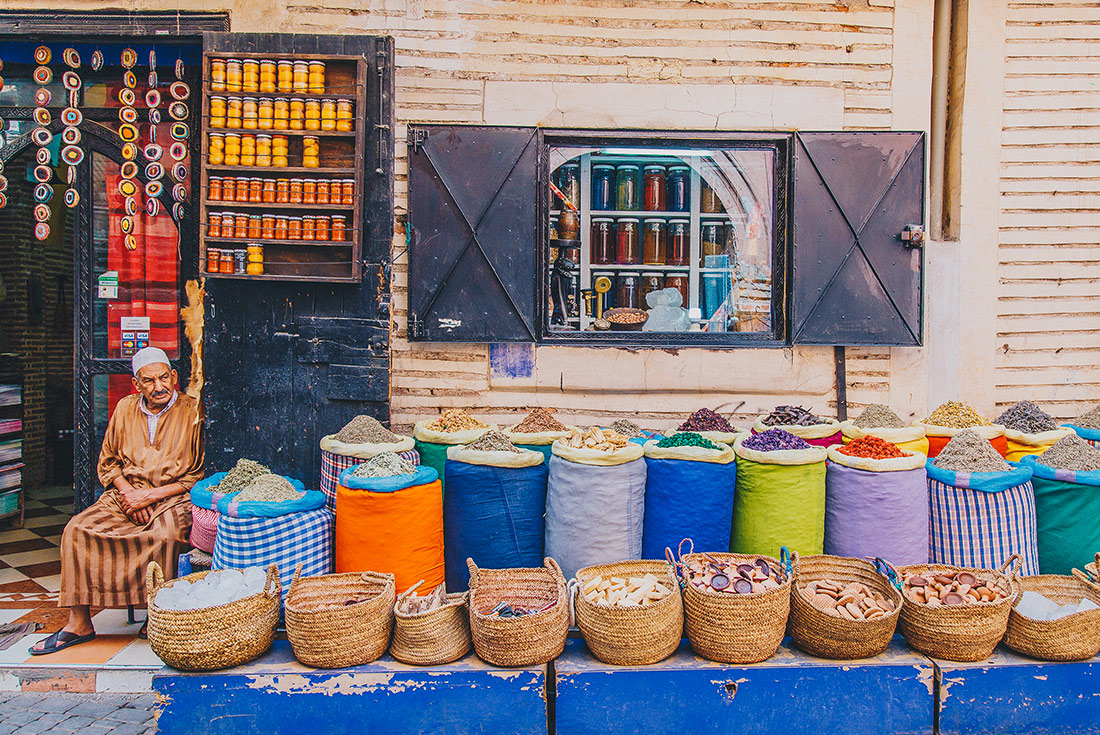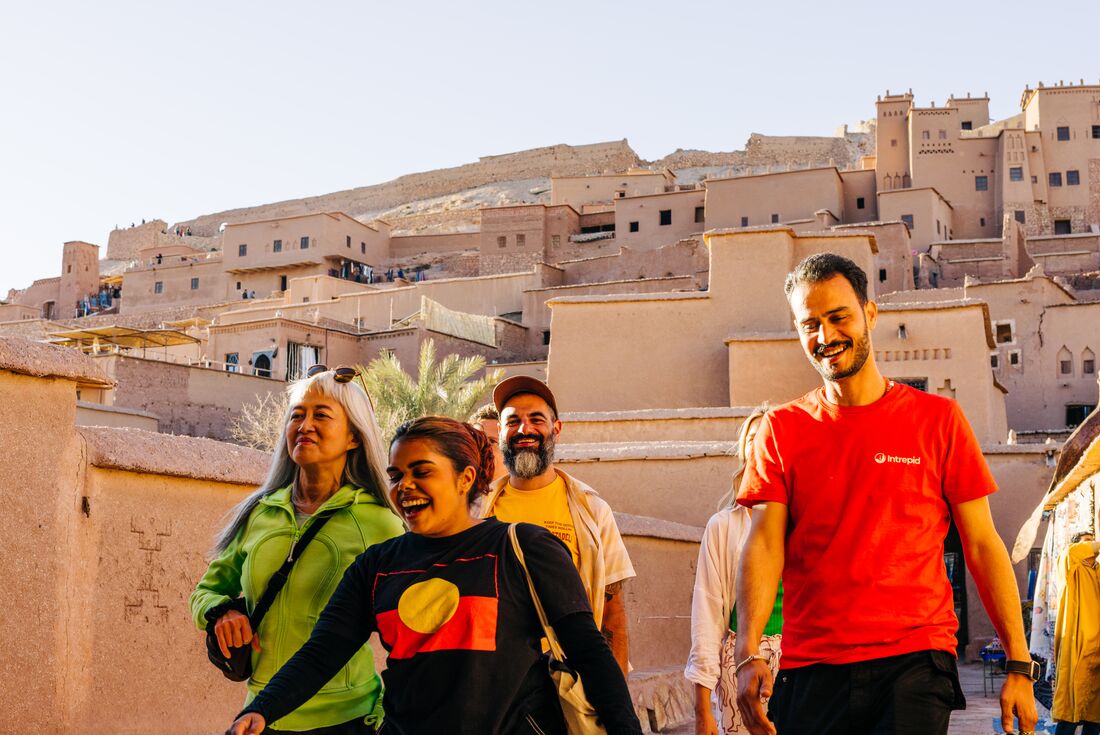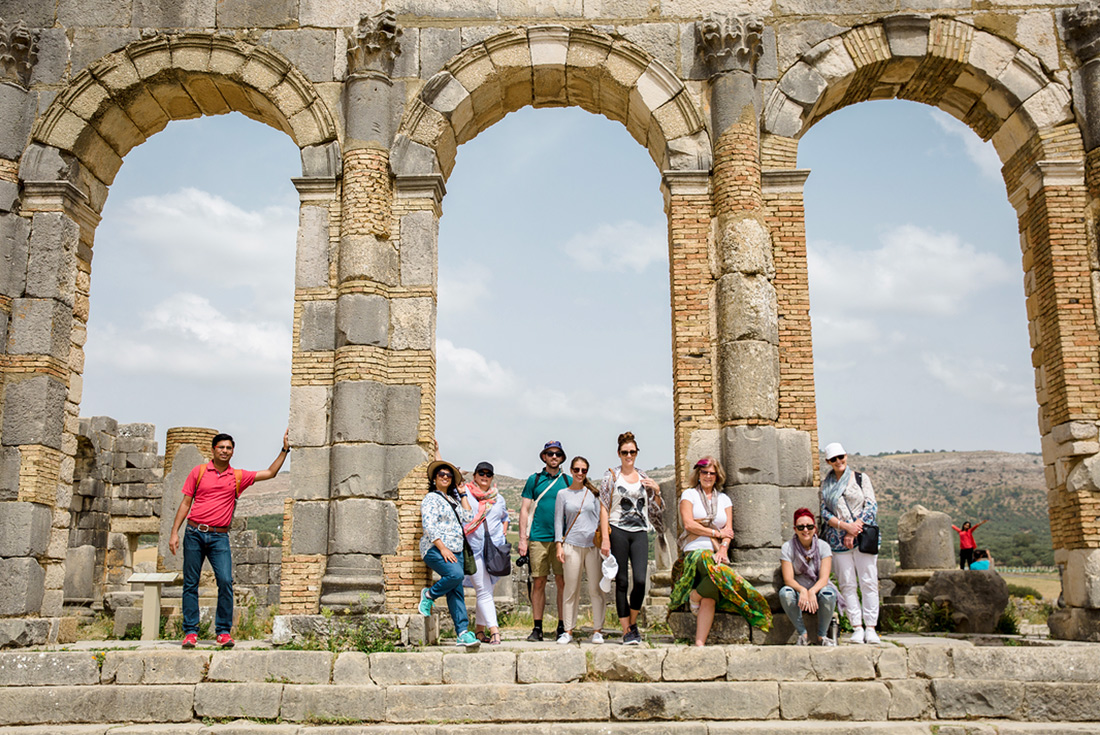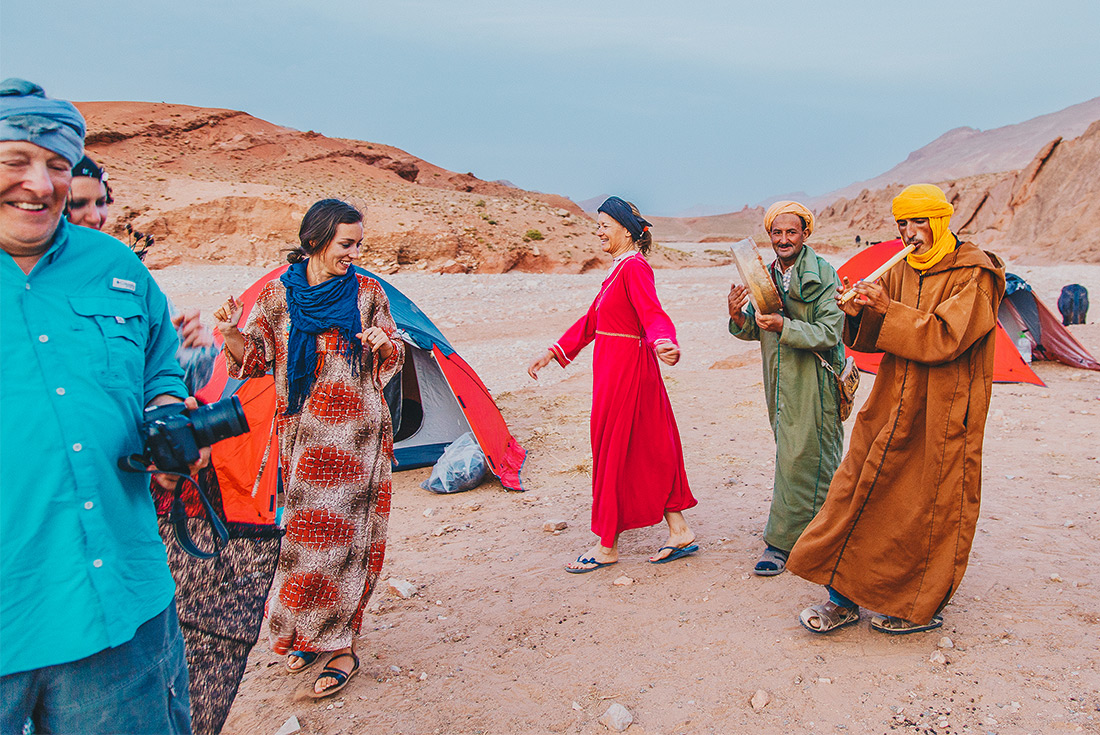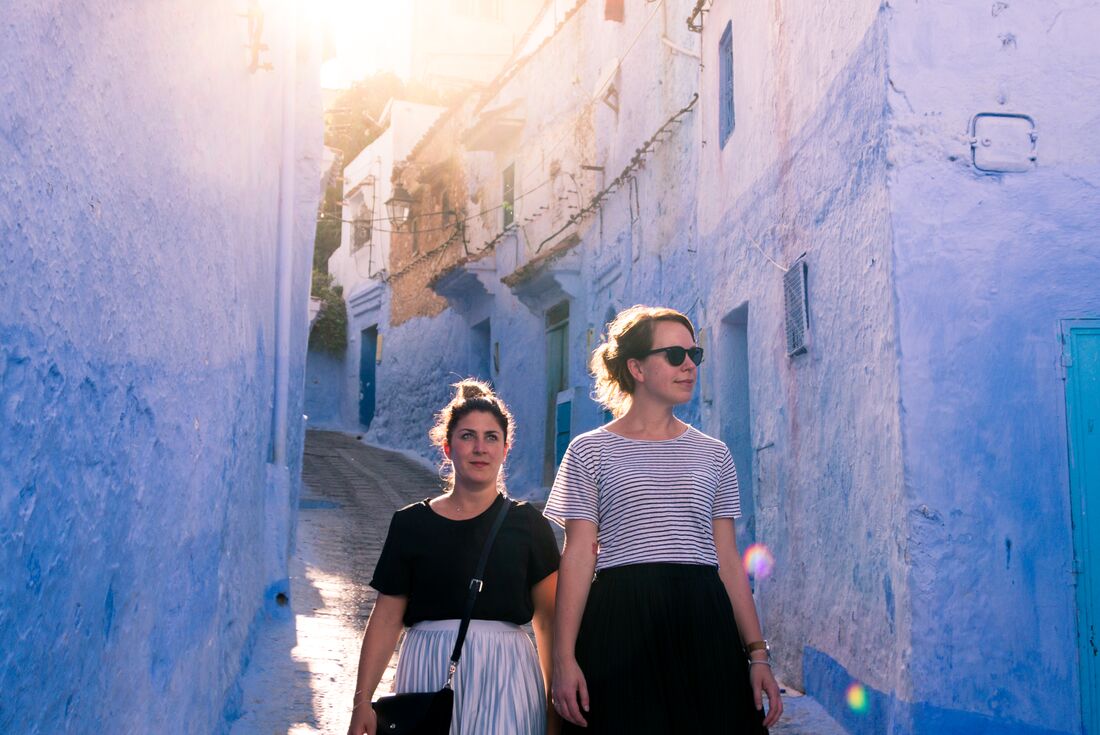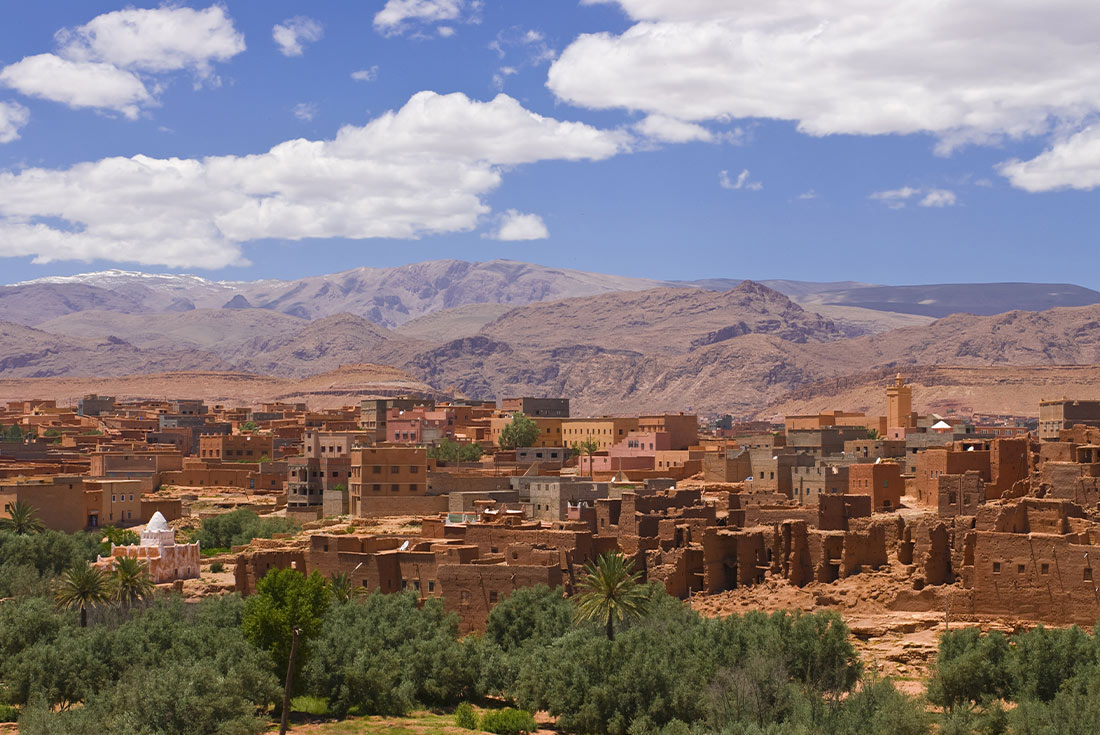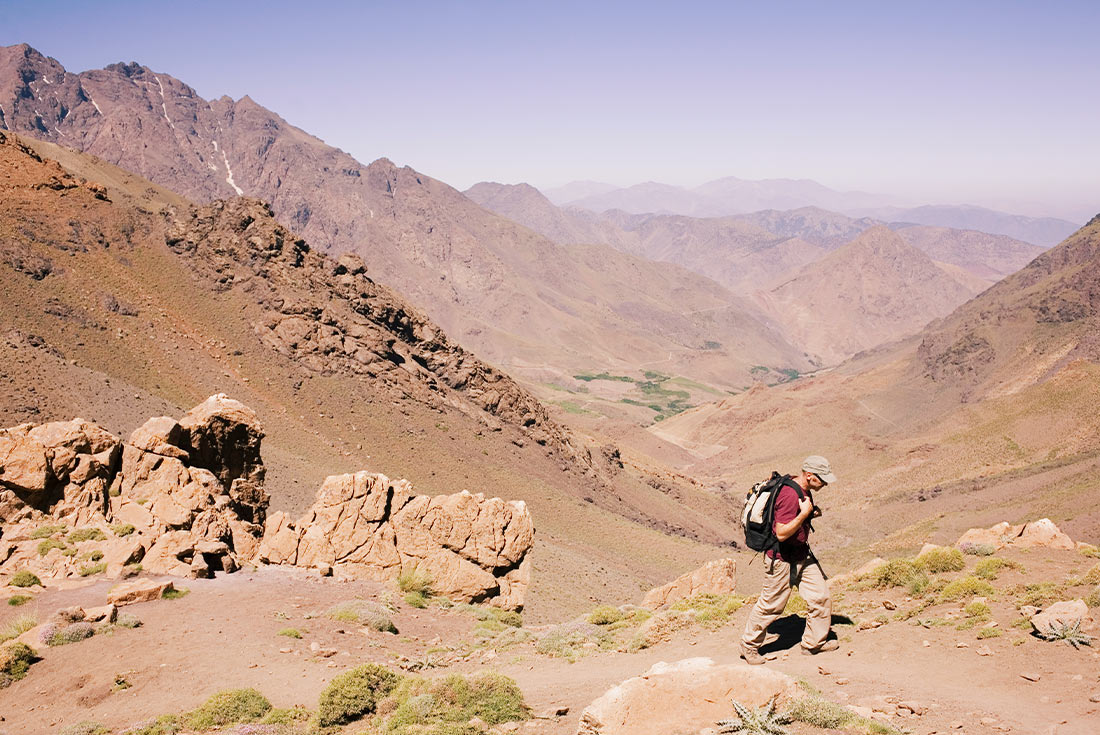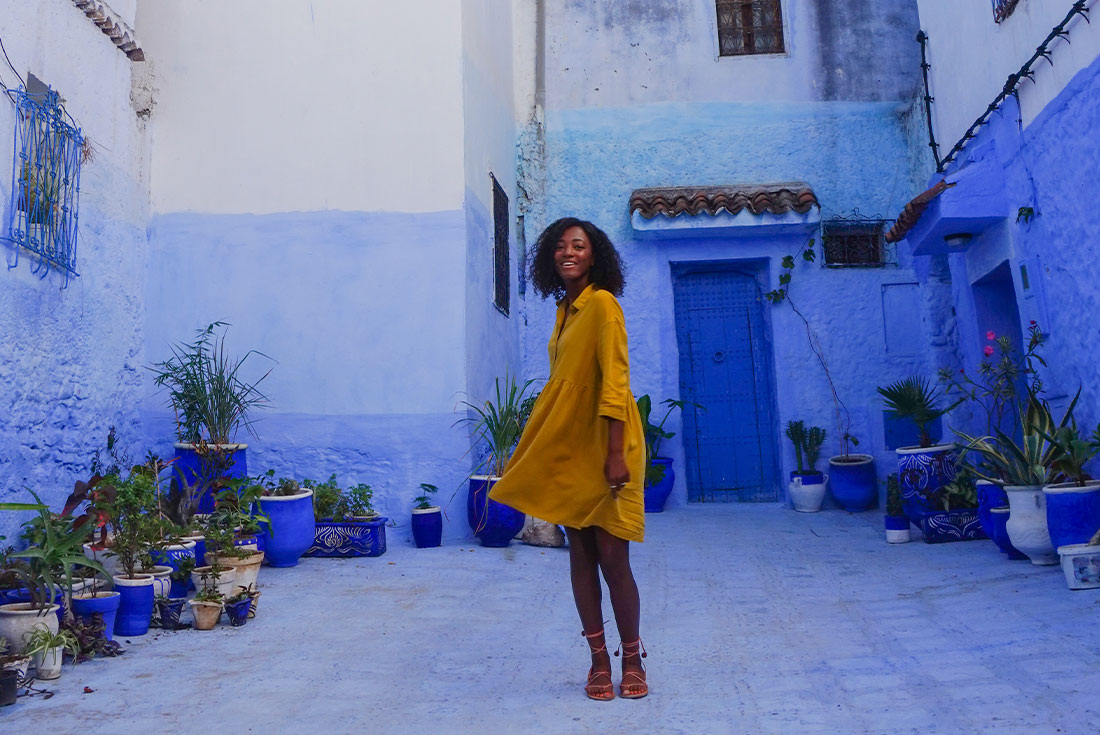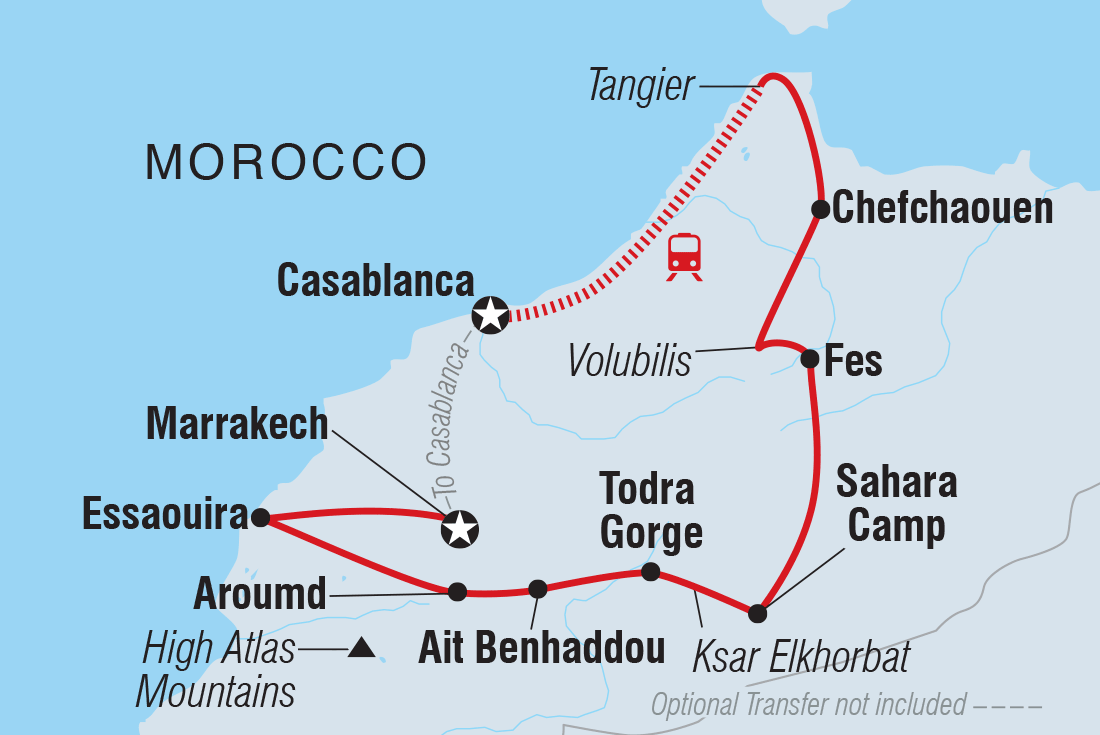Account Number : 63245268
Sort Code : 204281
Best of Morocco
Best of Morocco
If you’re looking for a two-week adventure full of Morocco’s highlights, this trip is for you! From sacred sites and bustling medinas to the expanse of the Sahara, you’ll be hitting all the popular hotspots and stopping for air in some of the country’s best scenery. Wander in the lanes of the blue city Chefchaouen, explore the Roman ruins of Volubilis and find the cultural heart of Morocco in Fes. Drive through everchanging scenery (look out for Barbary apes and nomadic shepherds along the way), ride a camel towards a desert sunset, hike through lush palm groves in Todra Valley, discover popular filming locations in World Heritage-listed Ait Benhaddou, kick back and unwind in seaside Essaouria and top it all off with the street food bazaars and performers in Djemaa el-Fna Square in Marrakech.
Tour At a Glance
- Trek through the dramatic red dunes of the Sahara Desert on a camel’s back, experiencing an unforgettable sunset – then stay under a blanket of North African stars in a desert camp.
- Embrace the Atlantic breeze in the coastal town of Tangier and see the vivid blue hues of Chefchaouen over sunset, while you explore the houses and laneways of this surreal city.
- Stay in a traditional Amazigh homestay high in the Atlas Mountains and enjoy a homecooked meal of Moroccan favourites, learning about the culture and traditions of an Indigenous population who’ve stood the test of time.
- Kick back in the coastal town of Essaouira and discover the winding laneways at your own pace. Then, meet a local fisherman by the seaside and learn about his life and this traditional practice.
- Explore the old medina of Marrakech and the labyrinthine medina of bustling Fes with knowledgable local guides, discovering the myriad of sights, smells and sounds along zigzagging lanes. Then, discover the colourful chaos of Djemaa el-Fna Square.
- Tour code: XMSC
- Group Adventure
Dates & Prices
Is this trip right for you.
- Don’t let the heat keep you from exploring the world! Summer temperatures can be extremely high in Morocco (over 40°C), which can make things uncomfortable. It’s essential to use sun protection, wear layers to combat the heat, and drink plenty of water.
- Ramadan is an annual month-long festival, during which travel can be a rewarding cultural experience, however some regular services may not be available during the day, such as restaurants or cafes, and occasionally travel can be disrupted by events. Your leader will adjust the itinerary accordingly, but please consider this when selecting your travel dates. You’ll find dates and further information in the ‘Climate and seasonal information’ section of the Essential Trip Information.
- There are a couple of long travel days on this trip, particularly the day travelling to the Sahara Desert. Rest stops will be made on the way and you’ll be rewarded with great views on the drive itself.
Accommodation
- Camp site (1 night)
- Gite homestay (1 night)
- Guesthouse (2 nights)
- Hotel (10 nights)
Joining point description
Hotel Al Walid is conveniently located opposite the main train station in Casablanca from where it is easy to discover the city. The hotel offers a sauna and a highly rated restaurant. Rooms are equipped with flat-screen TV, air conditioning and a minibar. Staff is available to help with any queries 24/7.
Joining point instructions
Intrepid can assist with pre-booking an arrival transfer from the airport - enquire with your agent. Please advise your flight arrival details at least 14 days prior to your departure.
For your confirmed arrival transfer, you’ll be met outside the airport at the ‘Navette shuttle’ sign located in front of Terminal 2's exit at Casablanca Airport (CMN) by a transfer representative holding an Intrepid sign. The driver will wait a maximum of one hour from the time the plane lands. In case of flight cancellations, changes, if you experience severe delays at immigration, baggage collection or customs, or if you are not able to find the driver, please contact the transfer operator directly: +44 20 4576 9838.
Alternatively, you can take a taxi from the airport to your hotel. The price should be agreed before entering the vehicle and should be approximately MAD250 during daylight hours and MAD300 at night.
Finish point description
Moroccan House Hotel Marrakech's rooms are equipped with air-conditioning, TV, phone and a mini bar. There is also a 24-hour reception, a swimming pool, a hamam (traditional Moroccan steam bath), a restaurant and laundry service. Luggage storage is available for early arrivals or late departures. The hotel is in Marrakech's new town of Gueliz surrounded by plenty of restaurants, cafes and shopping options. Other hotel facilities include a restaurant and pool. It takes only a few minutes by taxi to reach the Old Medina and gardens.
Finish point instructions
- If you have a confirmed departure transfer your leader will advise your pick up time the day before your trip ends.
- Alternatively, please ask your leader or hotel staff for assistance in arranging a taxi or instructions to reach the airport by public transport.
Safety
- Most national governments provide regularly updated foreign travel advice on safety issues involved with international travel. We recommend that you check your government's advice for their latest travel information before departure and ensure that your travel insurance covers you for all destinations and activities on your trip. Please refer to our website's safety page for links to major travel advisories and updates on safety issues affecting our trips here: We strongly recommend the use of a neck wallet or money belt while travelling, for the safe-keeping of your passport, flight tickets, cash and other valuable items. Leave your jewellery at home - you won't need it while travelling. Many of our hotels have safety deposit boxes, which is the most secure way of storing your valuables. A lock is recommended for securing your luggage. Your group leader or local representative will accompany you on all included activities, however, during your trip you'll have some free time to pursue your own interests or relax and take it easy. While your group leader or local representative will assist you with the available options in a given location, please note that any optional activities you undertake are not part of your Intrepid itinerary, and Intrepid makes no representations about the safety of the activity or the standard of the operators running them. Please use your own good judgement when selecting an activity in your free time. Please also note that your group leader or local representative has the authority to amend or cancel any part of the trip itinerary if it's deemed necessary due to safety concerns. Intrepid's operational safety policies can be viewed on our website at the link below. We recommend that you take a moment to read through this information before travelling, and would appreciate any feedback on how safety is being managed on our trips.
- THEFT AND PERSONAL SAFETY While travelling there is always the risk of pick-pocketing and petty theft, particularly in the more touristy cities. We recommend that you exercise caution when walking alone at night and encourage you to walk together and only on main, well-lit thoroughfares. Be particularly vigilant on public transport. Simple measures like carrying your day pack on your front, not hanging your bag over the back of your chair or on the floor and wearing a money belt will reduce any chance that your valuables should go missing.
- SCAMS: When walking through touristy areas of cities you may be approached by 'helpful' locals who want to show you where to go or take you to a local spice shop. They will either ask to be your local guide for the day or expect money when you arrive at your destination. Please note these people are not registered guides and will try and get as much money from you as they can. A friendly 'no thank you (or 'la shukran') should suffice. WOMEN'S SAFETY: Women should exercise caution when travelling in Morocco. While the risk of an incident occurring on your trip is very low, below are some things you can do for your safety and peace of mind when travelling: - As with all travel, it’s important to use common sense and be vigilant. - Respect local dress codes and customs, perhaps dressing more conservatively than you do at home. - Avoid isolated areas when alone at any time of day. - Lock your door when you are inside your room. Keep the door locked when you are leaving your room, even for a short time. - If hotel staff need access to your room for any reason, request that they do this while you are out, or wait at the reception while they attend to any cleaning or repairs. For the protection of both our travellers and staff, our leaders worldwide are not permitted to be alone in a room with a group member. - Always take a hotel card with you when going out so you know the address and contact numbers. - Should you encounter any inappropriate behaviour, inform your leader straight away. - For further information and advice, visit: PETTY THEFT AND PERSONAL SAFETY: While travelling there is always the risk of pick-pocketing and petty theft, particularly in the more touristy cities. We recommend that you exercise caution when walking alone at night and encourage you to walk together and only on main, well-lit thoroughfares. Be particularly vigilant on public transport. Simple measures like carrying your day pack on your front, not hanging your bag over the back of your chair or on the floor and wearing a money belt will reduce any chance that your valuables should go missing. FIRE PRECAUTIONS: Please be aware that local laws governing tourism facilities in this region differ from those in your home country and not all the accommodation which we use has a fire exit, fire extinguishers or smoke alarms. TRAFFIC AND DRIVING ON THE OTHER SIDE OF THE ROAD: Depending on where you come from please note that drivers in this part of the world may drive on the opposite side of the road from what you are used to. Look both ways before crossing any road. Traffic can be a little more chaotic than you might be used to at home. Be aware!
Medical and health information
- All travellers need to be in good physical health in order to participate fully on this trip. For the safety and wellbeing of yourself and others, if you are unwell prior to travelling, please stay at home and contact us to make alternative arrangements.
- When selecting your trip please make sure you have read through the itinerary carefully and assess your ability to manage and enjoy our style of travel. Please note that if in the assessment of our group leader or local representative a traveller is unable to complete the itinerary without undue risk to themselves and/or the rest of the group, we reserve the right to exclude them from all or part of a trip without refund.
- You should consult your doctor for up-to-date medical travel information or for any necessary vaccinations before departure. We recommend that you carry a first aid kit as well as any personal medical requirements in their original packaging as they may not easily be obtained while travelling. If you are carrying medication, ensure you check your government's foreign travel advice for any local restrictions or requirements.
- As a rule, we recommend you don't drink tap water in Morocco, even in hotels, as it contains much higher levels of different minerals than the water you may have at home. For local people, this is not a problem as their bodies are used to this and can cope, but for visitors drinking the tap water can result in illness. Generally, this isn't serious, an upset stomach being the only symptom, but it's enough to spoil a day or two of your holiday. Bottled water is widely available and your leader can recommend safe alternatives when available. Water consumption should be about two to three litres a day. Rehydration salts, motion sickness tablets, and diarrhoea blockers are recommended for you to pack in your personal first aid kit.
- For some travellers, the desert sand and dust can bring on bouts of asthma. If you suffer from asthma even occasionally, we recommend you bring your medication as it cannot be administered by your group leader and may not be readily available while you are travelling. A light scarf or face mask can also be helpful for all travellers.
- Henna tattoos are commonplace in Morocco. You should be aware that some henna tattoos contain the chemical para-phenylenediamine (PPD), which can cause a painful allergic reaction, including swelling and an itchy rash in some people.
GENERAL HEALTH
DRINKING WATER
ASTHMA
HENNA TATTOOS
Food and dietary requirements
- Moroccan food is, generally speaking, excellent though not particularly varied. Breakfasts usually consist of bread and jam with coffee or tea. Meals eaten out are reasonably priced - kebab and bread cost only about MAD 30. In main towns, it is possible to find very good French and Moroccan restaurants where a meal and French wine will cost anything from MAD 220 upwards. Generally, dinner is likely to cost between MAD 80-120 depending on what you drink - so an estimate for food would be about MAD 150-200 a day. Soft drinks are available at very reasonable prices, but generally speaking, alcohol is not widely available in Morocco due for cultural and religious reasons. Still, in some hotels and restaurants, you will be able to purchase beer, wine and spirits, but you will pay foreign prices or more for imported alcohol. Please be aware of local laws, believes and traditions, and be very sensitive and respectful while consuming alcohol. Your leader can help recommend restaurants each evening. Vegetarians can be catered for but there is a fairly limited choice of vegetarian couscous and tajine or omelets. This is particularly the case in rural parts of this itinerary. Please note that if you have any special dietary requirements you should inform us prior to the trip. Vegans and those on gluten-free diets may find this region very challenging and may need to supplement meals with their own supplies from supermarkets and markets. Wherever possible we will cater for dietary needs for any included meals, but there may be times when those with special requirements may need to provide their own.
Important Notes
- What you need to bring will vary according to the trip style you have chosen, the countries you are visiting and when you are travelling. Generally speaking, we recommend you pack as lightly as possible and make sure that you are able to carry and lift your own luggage and walk with it for short distances or up or down a flight of stairs. Our travellers usually find the smaller their luggage is, the more they enjoy the trip not having to worry about carrying heavy bags! Aim to keep your main luggage under 15kg.
- Many travellers carry their luggage in a compact smaller suitcase or backpack with wheels. We recommend your bag has carry straps or handles so it is easy to lift and carry for the times you are unable to wheel it (ie. on rough surfaces or up steps).
- If you are taking overnight trains, or primarily using public transport then the smaller your luggage the easier it will be to store under or above bunks. Large suitcases may not be able to be taken on board. A lockable bag or small padlock for your bag will be useful especially when travelling on public transportation as well.
- You'll also need a day pack/bag to carry water, camera, swimming suit, waterproof pouch/bag for phone, hiking shoes and jacket etc. when you’re exploring during the day.
- Below we have listed the essentials for this trip
- Please bring your own water bottle to refill along the way. Although it can be difficult to avoid bottled water when travelling, please use the water dispensers which are provided on some of our vehicles and at some of our accommodation. Your group leader or local representative will advise whether tap water is safe to drink in your destination, and if it is, you can simply refill it with tap water. When unable to avoid bottled water, it is better to buy the largest available and distribute it into your smaller bottle for the day. If you are walking or trekking as part of your trip you will need to carry at least 2L of water with you.
- Please review the weather at the time of year you plan to visit Morocco, particularly the overnight temperatures. If you feel the cold, from November to March you may find the heating and blankets to be insufficient at night. You may like to bring a sleeping bag or thermals to sleep in. Sleeping bags cannot be hired while on the trip and are not easy to buy outside of large cities.
- Please note that drones are not permitted to enter or be used in Morocco, neither for personal nor professional/commercial use.
BOTTLE
SLEEPING BAGS
DRONES IN MOROCCO
Passport and visas
PASSPORT
You’ll need a valid passport to travel internationally and most countries require your passport to have a minimum of 6 months validity, so remember to check the expiry date.
We need your passport information to get everything ready for your trip so it’s important that the information on your booking matches your passport exactly. Please take care to provide the correct details. We recommend carrying a copy of the photo page of your passport while travelling and leaving a copy at home with family or friends.
VISAS & ENTRY REQUIREMENTS
Many countries require a visa and obtaining the correct visa for your trip and any countries you may transit through is your responsibility. We recommend you check your visa requirements as soon as you have booked your trip. This will ensure you have time to prepare your documents and for your visa application to be processed. You can check the entry requirements for your nationality on your government's foreign travel advisories, consular websites or on our page here: www.intrepidtravel.com/visa-entry-requirements
Travel insurance
Travel insurance is compulsory on all our trips for those travelling internationally. We require that at a minimum you are covered for medical expenses including emergency repatriation. If you are travelling within your home country or region please confirm before travel that you are entitled to access the public medical system easily should an accident occur. We strongly recommend all travellers have a policy that also covers personal liability, cancellation, curtailment and loss of luggage or personal effects. For international trips, you will not be permitted to join the group until evidence of travel insurance and the insurance company's 24-hour emergency contact number has been sighted by your group leader or local representative.
If you have credit card insurance your group leader or local representative will require details of the participating insurer/underwriter, the level of coverage, policy number, and emergency contact number rather than the bank's name and your credit card details. Please contact your bank for these details prior to arriving in-country.
For travellers who reside within the European Union, Switzerland or USA the requirement to purchase travel insurance cannot be compulsory. However the purchase of travel insurance is still highly recommended, and travellers from these regions who decline travel insurance when travelling outside of their home region must sign a Travel Insurance Waiver Form at the Group Meeting, recognizing personal responsibility for emergency medical and repatriation costs should they arise.
For assistance with travel insurance or other services, please visit the link below:
Responsible travel
Our Responsible Travel Policy outlines our commitment to preserving the environment, supporting local communities, protecting the vulnerable, and giving back to the places we travel. All our trip group leaders or local representatives, suppliers, and staff are trained on these principles and are core to us delivering sustainable, experience-rich travel.
Explore the different parts of our Responsible Travel Policy by visiting:
Climate and seasonal
WEATHER IN MOROCCO
As a desert country, Morocco can have extreme weather. Winter (November to March) can be very cold, particularly in the mountains and the desert, with overnight temperatures dropping to 5 degrees Celsius or below. Even in summer the desert gets cold at night. It is recommended to bring a sleeping bag, thermals, a scarf, gloves and a warm jacket for travel in winter. Please be prepared for cold showers.
Summer (May to September) can be very hot everywhere, which means that it can be quite uncomfortable for those not used to the heat. It’s important to use sun protection and drink plenty of water.
Some of our guesthouses/hotels are unable to supply heating or air conditioning as this would be a major financial and environmental strain. It is also a case of energy supply and timing provisions, which are limited in some places.
EID AL-ADHA
Eid Al-Adha (Sacrifice Feast) will take place in Morocco 16 – 17 June 2024 and 6 – 10 June 2025. This festival honours the sacrifice Abraham made of his own son. In commemoration of this, an animal is sacrificed and divided into three parts: one-third of the share is given to the poor and needy; another third is given to relatives, friends and neighbours; and the remaining third is retained by the family. Please expect delays or complete suspension of public services during that time which may be disruptive to the trip schedule. For some, it may also be disturbing to see animals being sacrificed, as this can take place in public.
HIGH ATLAS MOUNTAIN PASSES
On this trip, you will cross the High Atlas Mountains through the impressive Tizi n’Tichka pass that rises to the altitude of 2,260 metres above sea level (7,415 ft). It is a great mountain road with breathtaking views. During the winter months (November to March) this part of Morocco can be hit by heavy snowfalls and it is possible for Tizi n’Tichka to become impassable. This usually lasts only for a day until authorities have a chance to clear the road. In the event of a snowstorm, your itinerary may be required to change. This is dealt with on the ground and depending on the situation we may re-route your itinerary or reverse it.
RAMADAN
The important month of Ramadan will be in progress 1 March to 30 March 2025 and the Eid ul-Fitr festival will be held directly at its conclusion for 3-4 days. Ramadan is a festival of sacrifice where the devout refrain from eating or drinking during daylight hours. During Ramadan, business hours are shortened, including opening hours at some tourist attractions. Alcohol is not permitted during daylight hours and many restaurants will be closed. While you should expect some delays and inconveniences during this period, the month is a fantastic opportunity to travel in a Muslim country and witness this unique period, particularly the nightly celebrations when the sun sets and the fast is broken. Please note that although the Eid ul-Fitr festival can also be a fascinating time to travel it's a period of national holiday. Most government offices and businesses will be closed and some tourist site opening hours may be affected.
Feedback
Can’t stop thinking about your adventure? Tell us all about it! We read each piece of feedback carefully and use it to make improvements for travellers like you. Share your experience with us at:

Why our customers love us?
Offering dependable travel solutions from the UK to the world over since 1984, we've gained the trust of a loyal customer base. Our customers know they can rely on us to offer the best prices and to provide impartial, expert advice on finding travel solutions to match their interests, time and budget.
Why book with Southall Travel?
- Exclusive deals for hundreds of destinations
- 24/7 expert assistance
- Price Match Guarantee*
- No fee on credit & debit card transactions
- ATOL protected
- Flexible payment options
- Low deposits
- *within 24 hours of booking
24/7 Customer Support
From our Travel Experts
![]()
Chat Online
With a Travel Expert
![]()
Request a call back
We will get back to you
Subscribe for latest deals
Sign up now and get the best holiday and flight deals straight in your inbox!
What our customers say...






